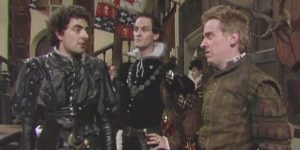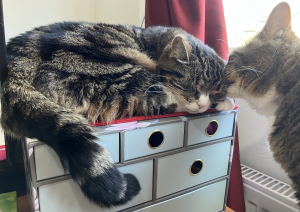Plus Alex North webinar available for catch-up, visualising plots, Blackadder lost pilot, why it’s hard to hear dialogue, group dynamics and more!
Hi there,
A couple of weeks ago, when I decided to move to a fortnightly schedule, I didn’t think it would be difficult to just write less. But did I really miss writing this newsletter last week, it turns out that I’ve gathered enough news and interesting links to fill two. It seems the challenge is going to be keeping this email below 1,000 characters when it could easily be double that!
Suw’s news: Ada Lovelace Day returns!
The reason that I’m writing a bit less often is that Ada Lovelace Day, the annual global celebration of the achievements of women in science, technology, engineering and maths, has been saved, thanks to the Royal Institution, Stylist, Digital Science, Redgate and dxw! I’d been in talks for months to see whether it might be possible to, ahem, save the day, so I’m delighted that we’ve managed it. But it does mean I’m going to be a lot busier now than I have been for a while.
I’ve also started a new Substack (yes, I know, another one) and have moved the entire Ada Lovelace Day mailing list over here in the hope that with Notes and Chat, we might be able to create a nice little community. Please do join us if you’re into cool stories of women in STEM, fascinating videos from our past events, plus book and podcast recommendations.
Suw’s news, two: Do you know where your keys are?
A month into the background research for Fieldwork, and I’ve had some fabulous conversations with ecologists around the world. The results have been a lot more slapstick than I’d anticipated, which is both interesting and slightly scary because I don’t really think in a slapstick kind of way, so it’s giving me a tiny bit of The Fear for actually writing this short. But I must not get ahead of myself, because I’m not even at the story planning point yet. It will all come in time.
Suw’s news, three: Alex North webinar available for catch-up
If you wanted to see the conversation I had with Alex North on 8 June, it’s now available for paid subscribers. We had a great chat, talking about the ups and downs of Alex’s career, his writing process, why he began to write under his pseudonym (you might know him better as Steve Mosby), and much more.
Event: The Clarke Awards
The Arthur C Clarke Award, which recognises the best science fiction novel first published in the United Kingdom during the previous year, announced their six book shortlist for this year’s award on the Science Museum’s blog.
The winner will be revealed at the award ceremony on Wednesday 16 August at a location TBC, so put that in your diary!
Tip-top tip: Visualising your plot threads
I loved this post from author Simon K Jones about how to visualise a book’s plot. It’s something I’ve thought about before and then gave up on because, as Simon also found, there isn’t really any software that makes it easy. I’ve tried mind maps, timelines and OmniGraffle in the past, but always gave up fairly rapidly because it was such a massive palaver and often hard or impossible to edit.
Simon’s solution is based on an XKCD comic:
The key thing here was in how they decided to map the stories. Time is on the horizontal, and than ‘relative geography’ is on the vertical. This depicts how characters come into contact with each other through the course of the story. Annotations then highlight key plot moments.
I tried using various digital art tools to recreate XKCD’s approach, all of which were a massive faff.
Then I remembered the existence of pencils, and had a go at using them on a slim, tablet-like device called paper. And it worked!
What I’m watching: Blackadder: The Lost Pilot
 Blackadder is such a beloved classic, you’d think that it had been thoroughly documented and analysed by now, but it seems that there’s some degree of fuzziness over its origins, not to mention a pilot episode that’s never been broadcast. All that is going to be put to rights by a new documentary, according to a great interview on Comedy.co.uk.
Blackadder is such a beloved classic, you’d think that it had been thoroughly documented and analysed by now, but it seems that there’s some degree of fuzziness over its origins, not to mention a pilot episode that’s never been broadcast. All that is going to be put to rights by a new documentary, according to a great interview on Comedy.co.uk.
Blackadder: The Lost Pilot sees Sir Tony Robinson on a quest to discover the truth behind the Blackadder origin story. Tony’s journey takes him back in time to find out where Blackadder really began, and to uncover the story of the never-before-broadcast Blackadder pilot episode.
It’s a personal story for Tony – Baldrick has defined his career and playing the character transformed his life. But Tony didn’t play Baldrick in the pilot. And there’s so much about Blackadder‘s beginnings he doesn’t know. Along the way he speaks to comedy greats including the series creator and writer Richard Curtis and co-writer Ben Elton. The climax of the programme is a special screening of the never-before-broadcast pilot.
You can watch the special this Sunday 25 June at 00:20 or 21:00 on UKTV Gold.
Read this: Why is it so hard to hear dialogue?
This fascinating piece on The Atlantic about why so many people are watching TV with subtitles on these days was a real eye-opener, and made me really hacked off with the streamers (as if I wasn’t already).
Specifically, it has everything to do with LKFS, which stands for “Loudness, K-weighted, relative to full scale” and which, for the sake of simplicity, is a unit for measuring loudness. Traditionally it’s been anchored to the dialogue. For years, going back to the golden age of broadcast television and into the pay-cable era, audio engineers had to deliver sound levels within an industry-standard LKFS, or their work would get kicked back to them. That all changed when streaming companies seized control of the industry, a period of time that rather neatly matches Game of Thrones’ run on HBO. According to Blank, Game of Thrones sounded fantastic for years, and she’s got the Emmys to prove it. Then, in 2018, just prior to the show’s final season, AT&T bought HBO’s parent company and overlaid its own uniform loudness spec, which was flatter and simpler to scale across a large library of content. But it was also, crucially, un-anchored to the dialogue.
“So instead of this algorithm analyzing the loudness of the dialogue coming out of people’s mouths,” Blank explained to me, “it analyzes the whole show as loudness. So if you have a loud music cue, that’s gonna be your loud point. And then, when the dialogue comes, you can’t hear it.”
Honestly, this is just another bit of proof that streamers are predominantly tech companies, not TV companies, and they do what makes sense to techies, ignoring or ignorant of all of the TV/film industry expertise that would make their shows technically better. (And let’s not get started on how bloody dark so much TV is these days!)
Stop, look, listen: Scriptnotes, E599 – Group Dynamics
I really enjoyed this episode of Scriptnotes on group dynamics, not least because I need to think about group dynamics for Tag. Craig Mazin points out that we really love seeing teams assembled and learning how to work well together, with each person bringing their own talents to the table. As usual, relationships are key and in group films that tends to mean that there’s one relationship that takes centre stage, but everyone in the team still gets to shine in their own way. It’s well worth a listen!
Obligatory cat picture
 I’ve been administering Grabbity’s eye ointment thrice daily, as instructed, but it’s nigh on impossible to tell if it’s working. She certainly seems a bit brighter in herself, but we’ll find out on 3 July when she has her next appointment with the specialist.
I’ve been administering Grabbity’s eye ointment thrice daily, as instructed, but it’s nigh on impossible to tell if it’s working. She certainly seems a bit brighter in herself, but we’ll find out on 3 July when she has her next appointment with the specialist.
Here she is, sitting on the little chest of draws on my desk, with Copurrnicus having a snuffle to see if she’s still her. He’s been sniffing her a lot, so I think the eye drops must make her face smell weird to him. I’m sure they taste disgusting for her, so she’s been getting lots and lots of treats.
That’s it for now! See you again in a fortnight!
All the best,
Suw





Comments on this entry are closed.